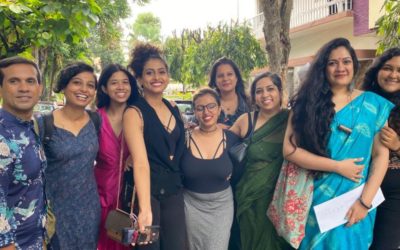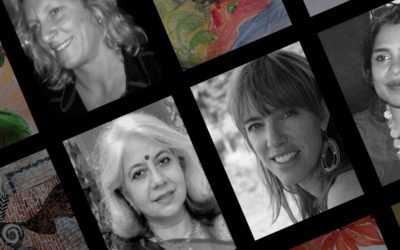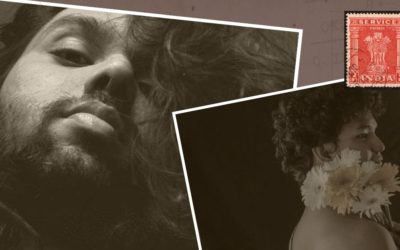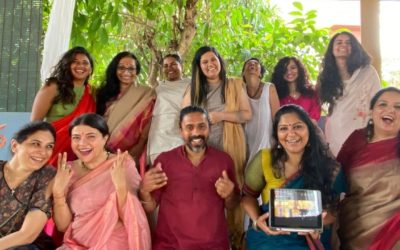Congratulations! Not on completing the course (though, if you have, pat yourself on the back). Congratulations on undertaking this journey. You’ve had to turn yourself inside out, you’ve been challenged to examine your biases and beliefs, the binaries you live by, your presence in relationship, in groups and your embodied presence in this world.
This work that we do is deeply profound. It is deeply profound because it offers an alternative to the conventional spaces and systems and dynamics of the world. I am not talking about the activities, the exercises or the, ‘What’ of what we do, but rather today, I am talking about, ‘How’ we do the work – the sensibility, and the approach. Developing this sensibility and approach can only happen when you turn yourself inside-out.
In June, I, along with Padmalatha Ravi (who is a graduate of this program) ran a 2-week course for teenagers on Gender, Identity, Theatre, and Film. The course had the unfortunate acronym of TGIF but, thankfully none of the teenagers knew what TGIF was! One of the things we did in the program was to invite guest facilitators. And one of the people that had been coming annually and had rave reviews for clear, structured, mind-blowingly profound ideas, was Dhamini Rathnam, who is this amazing queer, feminist, journalist.
Dhamini came again, but this time something was different. She didn’t control the session the same way, things felt scattered and loose. She introduced some interesting ideas but no one seemed to be engaging with it.
Padma wrote a note in her book and slid it over to me. It said, “Do we need to hold space?” An interesting question. Not, “What is up with Dhamini”, not, “Do we need to step in”, but, ‘Does our collective space need holding.’
Dhamini noticed our exchange and made an invitation to us.
So I did what we do and suggested, “Why don’t we get up and move a bit.” We moved and came into a circle and began to play some games that the participants were already familiar with (the YES game, step in sociometry, etc). And then we began to play a bit with the ideas that Dhamini had introduced – ideas about what is innate and what is learned. At this point, Dhamini shared with the group that now, after the election results were out (just a few weeks before), she felt like an ‘other’ in the country. And this was an experience of insecurity and anxiety that many people in her circle also shared. At this stage, one of the participants asked, “Dhamini, who is your ‘other’?” Dhamini said that that was exactly the question to ask for not only are we victims of othering but we are also agents who the other (both oppressed and oppressor).
Dhamini considered that question and asked everyone to consider with her. Padma suggested we create character sketches and when another participant asked if she could actually sketch, we all excitedly began sketching with lines, shadows, and words.
My own character sketch was detailed. Dhamini gave us permission to be honest and not to censor ourselves. She assured us that prejudices would emerge and that was ok. I was horrified at what came up for me. A fair-skinned North Indian man wearing kurta-pajama and a red tikka. He is dressed in all white, his car is white, his giant palatial house is white and he is surrounded by many men. I know what he eats, his family structure, his religious views, his predisposition to violence. I despised him.
Dhamini then asked us to look at our character sketches and find what we had in common with our other. At first, I didn’t think there could be anything. But I persisted and then realised that I too was resourceful and resourced. I too found ways to get what I want even if sometimes I did ethically questionable things.
It ended up being a deeply powerful session for all of us.
I stepped back and wondered, what made it such a meaningful four hours?
Was it the fact that we got up and moved? Was it also the fact that Dhamini refused to compartmentalize? She didn’t put aside her internal turmoil and just run the class. Was it the way that Padma had framed her question to me? That the students/participants had stepped in to engage? It was probably all those things. What made the session powerful was that it had become a process of aesthetic co-creation.
So within the way we work, within our sensibility and approach is the possibility of facilitating a space for aesthetic co-creation, between us and our clients, our students, our group members. The roles we play in these spaces will come with immense power – therapist, teacher, facilitator, director. But, we must choose how we hold practice to this power. Can we do it in a way that creates an egalitarian space of support and collaborative co-creation? Can we do it in a way that our participants feel welcome to challenge, just as we may challenge them? Can we hold space, but let go of control?
It is tricky, but, in my opinion, it is in this that the power of our work truly lies. The ability to generously hold space while letting go of control.
So, congratulations and I so look forward to working and learning with all of you in the coming years.
Maitri Gopalakrishna
Trainer & Supervisor, FECAT
At the graduation ceremony of FECAT batch of 2019
Blog
More than Striking a Pose
It was the summer of 2017. Five years into my Jazz dance training – a dance form that had shaped, moulded and transformed my body and the way I moved. It was an annual dance-off and I was performing a lyrical Jazz piece. Before leaping into the routine, I stood in the...
Beannacht (Blessing)
Congratulations! My apologies I can't be with you all today in person, as I am outside Bangalore being with my family as our grandmother has passed on. Each of you is in my thoughts today. Congratulations to each of you for having embarked and initiated your journey...
Transpersonal Space and Trauma
The conversation explores the Transpersonal Space while working with Trauma and Mental Health. The panel, Brinda Jacob-Janvrin (Expressive Art Therapy and Authentic Movement), Laura Smith-Riva (Natural Dreamwork), Katia Verreault (Trauma and the Body) and Sukhvinder...
Narrative Therapy
In this conversation on Narrative Therapy, Christy and Raviraj explore the idea of What makes a story and its influence on how we perceive ourselves, others and the world around us. They share stories from their lived experience and work and illustrate the politics of...
Time of My Life & Train Song
The batch before this one did their last bit online. The batch after this one met once in-person for the experiential sessions. But this class of 2020-21 got sandwiched between the 2 lock downs and were our test tube babies - nothing short of a miracle. They truly...
Dance, self-exploration, love, desire
Dancer and Art Therapist, Brinda Sarah Jacob in conversation with Odissi Dancer, Meghna Das. From the Ampersand Series.Blog







